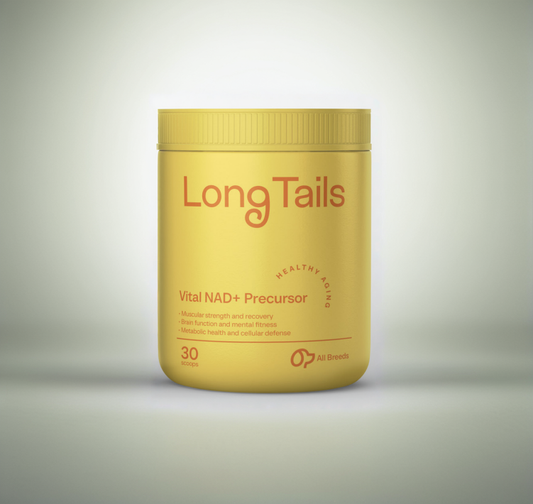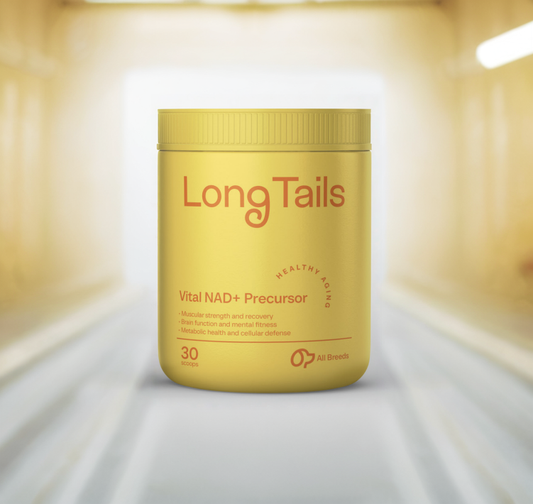L-Methylfolate: The Bioactive Folate Supplement That May Benefit Dogs with Depression-Related Conditions

L-Methylfolate: The Bioactive Folate Supplement That May Benefit Dogs with Depression-Related Conditions
As pet parents, we're always looking for ways to support our furry friends' health and well-being, especially when they face challenges like depression or anxiety. While a balanced diet, regular exercise, and plenty of love are essential, certain supplements may offer additional support. One such supplement gaining attention in human mental health research is L-methylfolate, the biologically active form of folate (vitamin B9). While studies on L-methylfolate in dogs are limited, the promising findings in humans suggest it may be worth exploring for our canine companions. Let's dive into what the research says about the potential benefits of L-methylfolate.
What is L-Methylfolate?
L-methylfolate is the metabolically active form of folate that the body can readily use. It plays a crucial role in various biochemical processes, including the synthesis of neurotransmitters like serotonin, dopamine, and norepinephrine, which are involved in mood regulation. While folate is found naturally in foods like leafy greens and fortified grains, some individuals may have genetic variations that impair their ability to convert dietary folate into L-methylfolate, leading to a functional folate deficiency.1
Potential Benefits of L-Methylfolate for Dogs
While research on L-methylfolate specifically in dogs is scarce, studies in humans suggest several potential benefits that may extend to our canine companions:
1. Supporting Mood and Mental Well-Being
One of the most promising areas of L-methylfolate research is its potential to alleviate depressive symptoms, particularly in individuals with genetic variations affecting folate metabolism. A study found that L-methylfolate treatment significantly improved depressive symptoms in patients with specific mutations in the MTHFR gene, which is involved in folate processing.1
Another study reported that L-methylfolate supplementation, when used alongside antidepressants, helped manage treatment-resistant depression in children and adolescents.2 While more research is needed to confirm these effects in dogs, supporting healthy folate status may be beneficial for canines with mood-related issues.
2. Promoting Neurological Development and Function
Folate plays a vital role in neural tube development during pregnancy and continues to support brain health throughout life. In a case report, a child with autism and a specific MTHFR gene mutation showed improvements in aggression and disruptive behavior after L-methylfolate supplementation.3
While this is an isolated case in a human patient, it highlights the potential of L-methylfolate to support neurological function in the context of genetic variations affecting folate metabolism. Further research is needed to explore whether L-methylfolate could offer similar benefits for dogs with neurological or behavioral challenges.
Is L-Methylfolate Safe for Dogs?
L-methylfolate is generally considered safe and well-tolerated in humans, with few reported side effects. However, it's important to note that the safety and optimal dosage of L-methylfolate for dogs have not been well-established.
As with any new supplement, it's crucial to consult with your veterinarian before giving L-methylfolate to your dog. They can help you determine if it's appropriate for your dog's individual needs and health status, and guide you on proper dosage and administration.
The Bottom Line
While research on L-methylfolate in dogs is still in its early stages, the promising findings from human studies suggest that this bioactive folate supplement may offer potential benefits for canine mood and neurological health, particularly in the context of genetic variations affecting folate metabolism.
As always, it's essential to work closely with your veterinarian when considering any new supplement for your furry friend. With their guidance and a commitment to overall wellness, L-methylfolate may be worth exploring as part of a holistic approach to supporting your dog's mental and neurological well-being.
References:
-
Rainka, M., Meaney, J., Westphal, E., Aladeen, T. S., Landolf, K. M., Stanford, S. B., ... & Capote, H. (2019). Effect of L-methylfolate on Depressive Symptoms in Patients with MTHFR Mutations (P3.9-057). Neurology, 92(15 Supplement), P3.9-057. https://doi.org/10.1212/wnl.92.15_supplement.p3.9-057
-
Dartois, L. L., Stutzman, D. L., & Morrow, M. A. (2019). L-methylfolate Augmentation to Antidepressants for Adolescents with Treatment-Resistant Depression: A Case Series. Journal of child and adolescent psychopharmacology, 29(5), 398–402. https://doi.org/10.1089/cap.2019.0006
-
Siscoe, K. S., & Lohr, W. D. (2017). L-Methylfolate supplementation in a child with autism and methyltetrahydrofolate reductase, enzyme gene C677TT allele. Psychiatric genetics, 27(3), 97–98. https://doi.org/10.1097/YPG.0000000000000170
This article is for informational purposes only. It is not, nor is it intended to be, a substitute for professional medical or veterinary advice, diagnosis, or treatment and should never be relied upon or perceived as specific medical or veterinary advice.
We recognize there may be different points of view or opinions on some aspect or even the premise of this article. Our goal at LongTails is to provide the best, clearest, and most helpful information possible to help keep your dog happy, healthy and safe.



